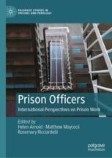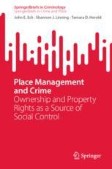Search
Search Results
-
Routine Activity Theory and 13 Reasons Why
Cohen and Felson’s (American Sociological Review, 44, 588–608, 1979) routine activity theory has been one of the most applied and researched theories...
-
Routine activity theory and malware, fraud, and spam at the national level
Email spam is one of the primary means to facilitate the perpetration of internet fraud and the distribution of malware. The present research sought...
-
The Effect of COVID-19 Restrictions on Routine Activities and Online Crime
ObjectivesRoutine activity theory suggests that levels of crime are affected by peoples’ activity patterns. Here, we examine if, through their impact...

-
Understanding Domestic Violence in India During COVID-19: a Routine Activity Approach
Domestic violence, a prevalent problem in India, saw an increase during the lockdown imposed to contain the spread of COVID-19. This article explores...
-
Prison Officers and Their Work Routine in Brazilian Prisons
In this chapter, I aim to analyse some of the attributions of prison officers (in Brazil, called penal police officers) and their everyday life...
-
Routine Activity Theory and Cybercrime Investigation in Nigeria: How Capable Are Law Enforcement Agencies?
The evolution of the Internet amidst a rapidly growing global economy has created a completely new environment in which traditional crime prospers....
-
Alone against the danger: a study of the routine precautions taken by voluntary sex workers to avoid victimisation
This article explores the routine precautions taken by sex workers (SW) in Switzerland, a country in which sex work is a legal activity. It is based...
-
Civilizing Space or Criminalizing Place: Using Routine Activities Theory to Better Understand How Legal Hybridity Spatially Regulates “Deviant Populations”
The combining of administrative, civil, and criminal law has broadened modern crime control mechanisms and greatly increased the legal authority and...

-
Situational Correlates of Adolescent Substance Use: An Improved Test of the Routine Activity Theory of Deviant Behavior
ObjectivesTo test the routine activity theory of deviance, we assess whether adolescents are most likely to use substances while they are involved in...
-
Desistance Theory and Its Relevance to Intimate Partner Violence
This chapter provides an overview of commonly cited definitions of desistance and theoretical frameworks for understanding the cessation and...
-
Routine Activities
The growth of technology, and specifically the Internet, has had a profound effect on what was considered routine behavior and actions. Nowhere has...
-
Routine activity effects of the Covid-19 pandemic on burglary in Detroit, March, 2020
The spread of the coronavirus has led to containment policies in many places, with concomitant shifts in routine activities. Major declines in crime...
-
Right place, right time? Making crime pattern theory time-specific
ObjectivesCrime pattern theory and the related empirical research have remained rather a-temporal, as if the timing of routine activities and crime...

-
Crime and COVID-19: effect of changes in routine activities in Mexico City
BackgroundThis study aimed to determine whether crime patterns in Mexico City changed due to the COVID-19 pandemic, and to test whether any changes...

-
What Does Criminological Theory Suggest About Slee** Away from Home?
This chapter reviews the criminological theories that can be applied to hotel and home-sharing security, specifically, defensible space theory,...
-
Why Some Places Are Bad
This chapter examines ten explanations for the universal concentration of crime at extremely small places: addresses and property parcels. We...
-
A New Theory of Globalization, Natural Resource Extraction and Violence Against Women: Toward Solving the Linkage Problem
A small, but growing, body of criminological knowledge shows that natural resource extraction activities contribute to violence against women in...

-
Literature Review Topic Two: Adult Learning Theory
This chapter is the second of two literature review chapters. It comprises Topic 2—Adult Learning Theory and synthesizes literature on Learning from...
-
Background and Introduction
This chapter presents the background, contexts, and overview of the cybercrime challenge in Nigeria. The chapter presents foundational information of...
-
Theory of Crime Convenience
The emerging theory of convenience for white-collar offenses, such as environmental crime, is concerned with economic possibilities and threats,...
